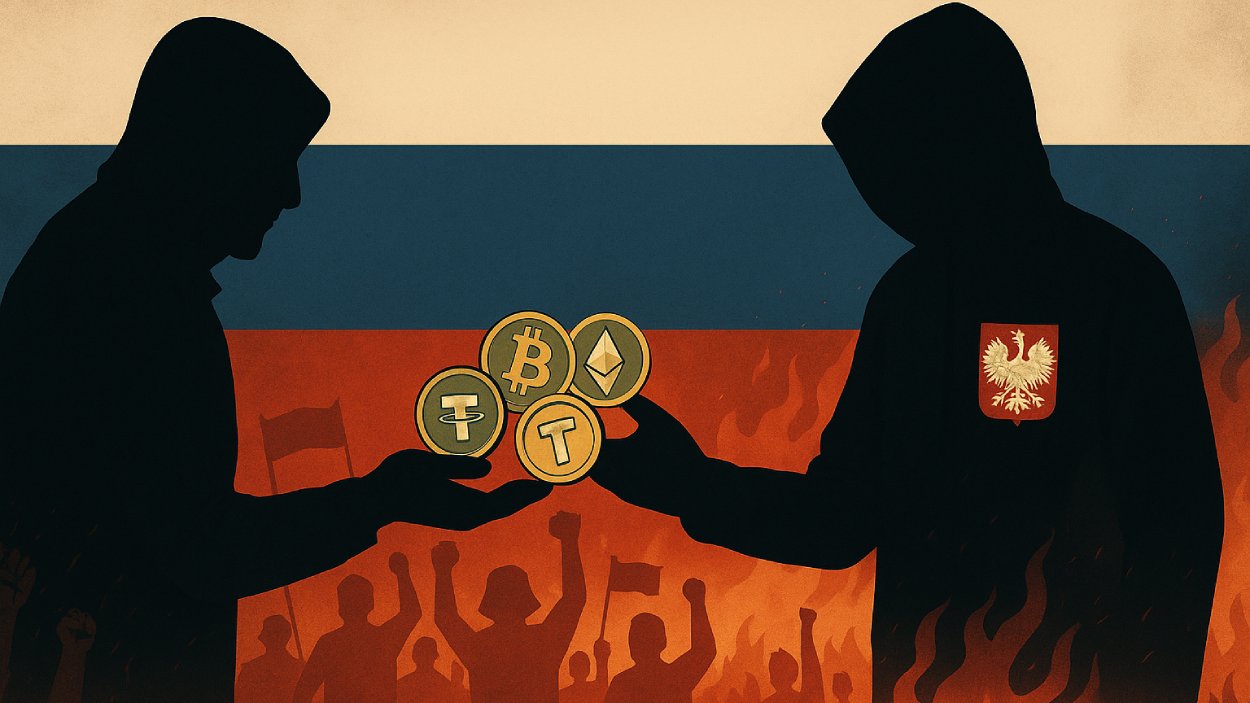Russia is allegedly using cryptocurrencies to finance espionage, sabotage, and covert operations across the European Union, according to senior Polish security officials.
Quick Summary – TLDR:
- Poland uncovered a GRU-linked spy network in 2023, heavily funded through cryptocurrency
- Russia allegedly uses digital assets to avoid sanctions and fund sabotage in EU countries
- New Polish legislation aims to tighten crypto oversight and block foreign misuse
- Authorities warn that cryptocurrency is enabling anonymous funding of hostile operations
What Happened?
Poland’s top national security official, Sławomir Cenckiewicz, has raised serious concerns over Russia’s alleged use of cryptocurrency to bankroll sabotage missions and intelligence gathering across Europe. According to him, digital assets are allowing Moscow to mask payments and carry out hybrid attacks, all while dodging financial scrutiny from international watchdogs.
Poland is in state of cyberwar with Russia — country’s national security chief
— RT (@RT_com) October 13, 2025
‘It’s not a state of threat any more,’ said Slawomir Cenckiewicz
He also accused Russia of using crypto to finance hybrid attacks on EU states
They just want you to be always scared and obedient… pic.twitter.com/LlUPSXsrHd
Russia’s Covert Crypto Operations Revealed
A network of operatives tied to Russia’s GRU military intelligence agency was uncovered in Poland in 2023, and investigators found that it had been “to a high extent” financed with cryptocurrency. The payments were reportedly used for a wide range of activities, including drone incursions, attempts to hack water supplies, and sabotage missions targeting European infrastructure.
Cenckiewicz told the Financial Times that Moscow “is probably continuing” to use these methods to this day. These tactics, according to Polish officials, are designed to avoid detection by traditional financial surveillance systems.
The Kremlin’s crypto playbook is not new. Investigations have previously shown that GRU agents used Bitcoin to fund misinformation and infrastructure during the 2016 U.S. elections. More recently, blockchain analytics exposed a Russian-linked network processing billions of dollars in stablecoin transactions, especially via Tether (USDT), to evade Western sanctions and finance influence operations in Moldova and Central Asia.
Poland’s Legislative Crackdown
In response, Poland is pushing forward with tough new laws to regulate its crypto-asset market. A bill recently approved by the country’s lower house includes prison sentences for those failing to meet compliance standards. The legislation, Cenckiewicz said, is a critical step to blocking foreign powers from using digital currencies as invisible funding tools.
He emphasized that Polish intelligence is deeply involved in the process, saying, “The Polish intelligence services are very much interested in this whole legislative process, to ensure there are no gaps.”
The move aligns with broader European efforts to close loopholes in crypto oversight. The Polish government is particularly concerned about “ad hoc” local agents that Russia is allegedly recruiting for short-term sabotage missions. These operatives are often paid small sums in crypto, making it easier to remain under the radar and minimize the risk of detection or accountability.
Moscow’s Use of Crypto to Dodge Sanctions
After being cut off from the SWIFT payment system following its full-scale invasion of Ukraine in 2022, Russia increasingly turned to crypto tokens, exchanges, and decentralized networks to keep financial flows active. According to Cenckiewicz, this shift has transformed the geopolitical cyber landscape.
“When we look at the cyber domain, Poland is now in a state of war with Russia. It’s not a state of threat any more,” he said.
Over the past year, Poland has expelled several Russian and Belarusian diplomats and shut down two Russian consulates. Cenckiewicz noted these figures were likely just “the first layer” of a more extensive infiltration network, now largely reliant on local actors for its covert missions.
SQ Magazine Takeaway
To me, this story is a wake-up call for how digital finance can be twisted into a weapon. It’s not just about money anymore. Crypto is now part of modern warfare, used not only to bypass sanctions but to quietly fund attacks that threaten lives and democracy. I think Poland’s proactive stance sets a strong example for other EU nations. We love the promise of decentralized finance, but not at the cost of national security. Striking the balance between innovation and defense has never been more urgent.


































































